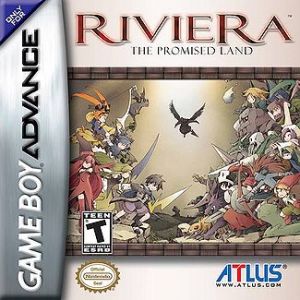Riviera: The Promised Land
Riviera: The Promised Land is a role playing game that was developed by Sting, Published by Atlus Software, and released for the Nintendo GameBoy Advance on June 28, 2005.
| Developer: Sting Publisher: Atlus Software Release Date: June 28, 2005 Platforms: GBA JustRPG Score: 79% Pros: +Appealing Characters. +Fun combat system. +Good soundtrack Cons: -Repetitive. -No replay value. -Dated visuals. |
Riviera: The Promised Land Overview
Riviera: The Promised Land is a role playing game for the Nintendo GameBoy Advance that puts the player in the role of Ein, a Grim Angel who must battle monsters to seal the four fountainheads of evil. The combat is turn based and well done which keeps the game fresh and enjoyable.
Riviera: The Promised Land Screenshots
Riviera: The Promised Land Featured Video
Riviera: The Promised Land Review
|
The Game Boy Advance has had a successful career, but all things come to an end, and May is most certainly the GBA’s last hurrah. However, as with any platform, that last hurrah brings with it a flood of software that had been in development for most of the system’s life. Such is the case for Riviera: The Promised Land. Compared to this high standard, the game is hardly impressive, yet it has a certain life unto itself that still makes it worth a look during this, the end of GBA’s days. |
|
Large-headed sprites rule this adventure, though given the relatively active nature of their animation, you might be distracted from this fact for a few minutes. There’s little else to say, as Riviera is just very similar to most contemporary GBA games, and even lacks the subtle flair of Fire Emblem’s animations. Still, it’s nothing to complain about. |
|
That is something of a trend in Riviera, one that certainly stretches to the audio. While Riviera does well with what it has to work with, and even makes use of voice samples, it’s hard to get excited about GBA audios that lack the thematic value of, say, Castlevania—which isn’t to say the tunes don’t have a certain charm that definitely grows on throughout the game. It just lacks any real ‘wow’ factor. |
|
The only ‘wow’ in the story is generally from the phrase, “Wow, for an angel this guy sure has a way with the ladies.” Riviera puts you in the shoes of Ein, one of the Grim Angels sent from Asgard to prevent the coming of Ragnarok. This, however, calls for the destruction ofRiviera, the ancestral home of the demons. However, also residing there are the Sprites, a collective race of demi-humans who seem to have fairly lazy lives. Sensing Ein’s hesitation and kind heart, the protective goddess of these people, Ursula, erases Ein’s memory and allows him to see the Sprites as the kind people they are rather than some shadowy demon-spawn, which in turn prompts him to fight the returning demons to save the Promised Land. |
|
This sounds much more impressive in print than it is in the game. Riviera is actually a rigidly linear and fast-paced game that doesn’t care to dwell on silly things like story. The only particularly variable aspect of the game is in Ein’s relationship with his Sprite companions, all four of whom are potential love interests. It’s not much, but a good number of Ein’s attempts at romance or sentiment are funny in a sad sort of way. |
|
But worry not; Riviera’s development budget did go somewhere, resulting in some unusual and quirky gameplay. Taking a page from ancient menu-driven games, Riviera enjoys the use of branching paths with a handful of objects in each room of a given map to examine. Doing so, for the most part, consumes TP, a meter filled through skillful performance in battle. Examining objects occasionally triggers short timing based mini-games, which spices up the exploration, mostly due to the suddenness of the things. |
|
Battle is a mix of intrigue, with elements tweaked or borrowed from all over. At the start of each battle, you must choose four, and only four, items to carry with you. In a normal battle, these items even break. However, using items, depending on the character doing so, will result in teaching the character new Overdrive skills, as well as increasing their stats. Overdrive skills are powered by the creatively termed Overdrive Meter, a bar that is filled by successful attacks in combat. The Overdrive Meter is divided into three levels, which the individual skills fall into. Supposing the Overdrive Meter was full, a Level 1 skill would consume one level, a Level 2 skill would consume two, and a Level 3 skill would naturally consume the entire Meter. Of course, the skill would also refill it to some extent, and careful manipulation of this trait is essential to killing enemies in a timely manner. |
|
Then again, dragging out battles may be a blessing in disguise, because Riviera is a decidedly short game. Obsessively using Practice Battles (a mode in which weapons cannot break) to learn every skill I could from the weapons I found, I finished Riviera in something less than 20 hours. While this is a bit above par for the system, such level-intensive playing is far from necessary. |
|
In all, Riviera is a merely solid game in a crowd of giants like Fire Emblem: The Sacred Stones. But for all that, it managed to etch itself a little place in my memory, and I can’t help but recommend it to any RPGer with a little time and an open mind. |
| Final Grade: 79% |
Riviera: The Promised Land Videos
Riviera: The Promised Land Trailer




















